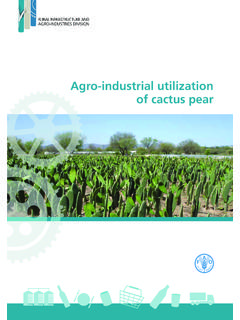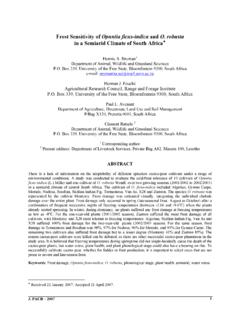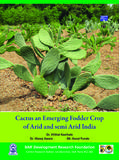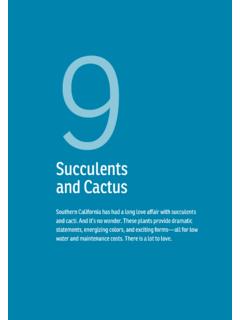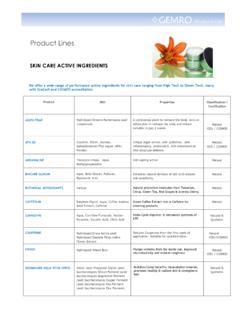Transcription of HARVESTING NATIVE PLANTS IN TIPS FOR …
1 HARVESTING NATIVE PLANTS IN NEVADA Digging up cactus and yucca on public or private land in Nevada is a regulated activity. On federal land owned by the Bureau of Land Management (BLM), permits and tags are required. Forest Service and National Park Service do not allow harvest of NATIVE PLANTS on their lands. On private land, written permission of the landowner is required for harvest of PLANTS in numbers of five or less. Harvests on private land for commercial purposes require a NATIVE flora harvest registration permit. Commercial purposes is defined as the removal or possession of six or more cacti and/or yucca (including Joshua trees) in any one calendar day, or removal or possession of one or more PLANTS for seven consecutive days.
2 The registration permit must have the legal description of the land and the notarized signature of the landowner. Desert flora tags issued by the Nevada Division of Forestry or BLM must be properly attached to each plant with a special cord, so that the tag cannot be removed without cutting the cord. Tags may not be reused and may not be removed until after planting by the final owner, who retains the tags. ( PLANTS that have been propagated at local nurseries from cuttings or seed do not require tags.) The only exception is the use of PLANTS for scientific or educational purposes, which requires no tags. Permission from NDF or BLM must be obtained in these cases. Shipping permits are issued by the Nevada Division of Forestry and are required to transport cactus or yucca for commercial purposes within or out of the state of Nevada.
3 The shipping permit should include the tag numbers of the PLANTS in the shipment and have the current date approved for shipment. Movement of PLANTS within a single private property parcel does not require a shipping permit. PLANTS being shipped to Nevada from other states must be accompanied by a valid shipping permit, issued by the originating state ( Arizona, California), or, if that state does not require a shipping permit, then a notarized permit or contract from the legal landowner, specifying the origin of the PLANTS by legal land description and the number and kinds of PLANTS in the shipment. Interstate shipments must also have a certificate of inspection issued by the Department of Agriculture of the originating state.
4 Arizona or California PLANTS must also have properly attached tags and seals issued by the corresponding Agriculture department. Violations of these laws may result in confiscation of PLANTS , fines and/or jail for each offense. Nurseries and buyers should inspect and keep copies of all required documents and invoices or bills of sale when purchasing desert PLANTS . Call the Nevada Division of Forestry with questions or to report violations: (702) 486-5123. tips FOR BUYING NATIVE PLANTS IN NEVADA NATIVE PLANTS , including cactus, yuccas and others that are harvested and sold in the nursery trade are subject to the regulations of different agencies. NATIVE PLANTS propagated by licensed nurseries do not have to have the special " NATIVE plant tag" so long as their origin can be clearly traced.
5 Here are some tips to avoid trafficking in illegal PLANTS : Buy PLANTS from a licensed nursery dealer. Check with the Nevada Department of Agriculture to see if someone is licensed. If the PLANTS were collected in the wild, make sure each one is tagged with a NATIVE plant tag issued by a government agency such as BLM or Nevada Division of Forestry. If the tag looks old, it may have been used before. Check the legality with the agency named on the tag, either BLM, NV Division of Forestry, or other. Get a written bill of sale from the seller. If they are unwilling to give you one, be suspicious. Keep all tags and invoices on file. Tags do not have to stay on the plant, but they should be in the possession of the final owner.
6 Cactus owners may be asked at any time to provide this information. Common cactus and yucca species Front cover: Joshua Tree, Yucca brevifolia Red Barrel Cactus, Ferocactus acanthodes Scarlet Hedgehog Cactus, Echinocereus engelmannii Beavertail Cactus, Opuntia basilaris Silver Cholla Cactus, Opuntia echinocarpa Nevada Division of Forestry Southern Region Headquarters 4747 West Vegas Drive Las Vegas, Nevada 89108 Business Phone (702) 486-5123 Fax Phone (702) 486-5186 Office hours are 8:00 am to 5:00 pm M F State of Nevada NATIVE Plant Laws Cactus and Yucca are protected in the State of Nevada Nevada Revised Statutes through

